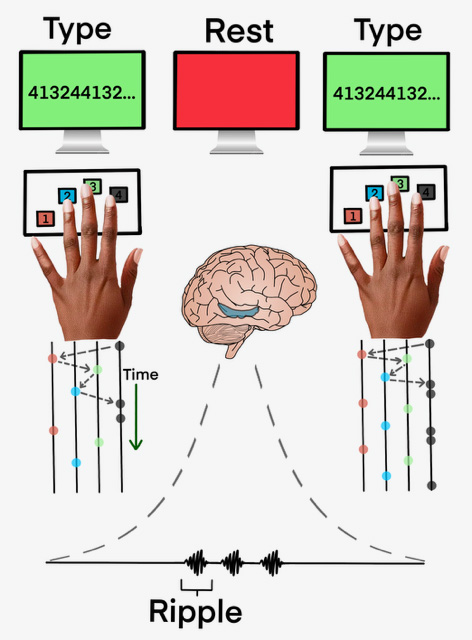By Bryan Baxter and Dara Manoach
Imagine you’re trying to learn a new skill, like playing the piano. You practice continuously but can’t get any better. Grinding on just isn’t helping. That’s because much of our skill learning happens ‘offline’ during rest breaks and the sleep that follows. For example, when young healthy people learn a typing task, they generally don’t get better while typing. Instead, they improve offline, during the rest breaks that are interleaved with typing.

While learning a typing task, epilepsy patients got faster after brief rest breaks rather than while typing. There was a corresponding increase in hippocampal ripple rate that predicted these offline gains in speed.
We previously found that patients with severe amnesia due to damage to both the right and left hippocampus (a brain structure critical for forming memories) show the opposite pattern. Their performance gets worse over the rest breaks, but they compensate while typing. This indicates that an intact hippocampus is necessary for offline motor learning during brief rest periods. But it does not reveal how this learning happens. So we turned to rat studies, looking for clues. When rats pause while navigating a maze, hippocampal neurons “replay” the path they took (meaning that they repeat electrical activity patterns that occurred when they were traveling on the path). This replay occurs during brief rhythmic bursts of neuronal activity called “hippocampal ripples”. Hippocampal ripple rate during these pauses predicts subsequent navigation success, and disrupting these ripples impairs navigation—suggesting that ripple-related memory replay during wakeful rest is critical for learning.
This led us to ask whether hippocampal ripples also mediate motor learning during brief periods of wakeful rest in humans. Because measuring hippocampal ripples requires invasive recordings, we worked with people with epilepsy who had electroencephalographic (EEG) electrodes implanted directly in their hippocampus to monitor its activity as part of a medical work-up for the treatment of intractable seizures. While participants performed the typing task, we measured changes in speed ‘online’ during typing and ‘offline’ over the rest breaks that were interleaved with typing. Like young healthy people, individuals with epilepsy showed more improvement (i.e., gains in speed) across brief rest breaks than while typing, and this was accompanied by a higher ripple rate. Importantly, more ripples predicted greater improvement over rest breaks. (This was not true for ripples occurring during typing.)
To follow up, using noninvasive brain recordings our lab is now trying to detect in humans the memory replay that in rats accompanies hippocampal ripples. We are also trying to determine whether this ripple-related memory replay goes awry in individuals with neuropsychiatric disorders such as schizophrenia. Understanding this could improve our ability to treat such conditions in the future.
Bryan Baxter is an Instructor and Dara Manoach is a Professor, both in the Sleep Cognition and Neuropsychiatry (SCAN) Lab in the Department of Psychiatry at MGH and HMS.
Learn more in the original research article:
Hippocampal ripples predict motor learning during brief rest breaks in humans
Sjøgård M, Baxter B, Mylonas D, Thompson M, Kwok K, Driscoll B, Tolosa A, Shi W, Stickgold R, Vangel M, Chu CJ, Manoach DS. Nat Commun. 2025 Jul 2;16(1):6089. doi: 10.1038/s41467-025-61136-y. PMID: 40603846; PMCID: PMC12222441.
News Types: Community Stories
